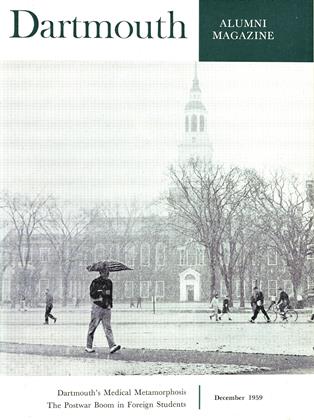Two amateur alpinists, Dr. George Cochran '53 and Richard Beatty '53, have had the rare experience of being able to name a mountain in honor of their alma mater. Their new "Mt. Dartmouth" is a 10,000-foot peak located in a wild and remote section of British Columbia's Pacific Coast Range, where Cochran and Beatty went in the summer of 1956 as part of a four-man climbing and exploring expedition. It was climbed for the first time on record and named by the pair, and they have now had the satisfaction of having the name officially accepted by the Canadian government's Board on Geographic Names.
Leaving New York early in the summer in his station wagon, Cochran picked up Beatty in Ann Arbor, Mich., where he had been studying at the University of Michigan Law School. They journeyed together toward the West Coast and then northward across the border up into Canada where they made contact with the rest of the party in Princeton, British Columbia. With the car loaded "far beyond Detroit's intentions," they pushed steadily into the province's wild interior, finding the roads more and more hazardous to negotiate. However they managed to arrive safely at last at what was to be their last contact with civilization for many weeks, a hunting lodge on remote Chilko Lake.
From here, traveling first by boat and then by foot, they cut a passage up into a region known only as the "Mysterious Plateau," an extensive and desolate snowfield that had been viewed from the air but was largely unexplored and only sketchily charted. Pushing, through the dense brush and up craggy valleys with full packs was hard going, but their perseverance paid off and they gained more open country above the timber line and set up their base camp. The group started climbing nearby elevations together and then after a few days split up, the British going off on a specialized glacial study by themselves.
Beatty and Cochran, now alone, started slowly back toward their base cabin, taking time to examine the countryside along the way. One day on a side trip they followed a mountain stream named "Torch Creek" up to the head of its valley where stood an impressive peak that issued an unmistakable challenge. The two mountaineers were up early the next day and started the ascent. It was rough going over soft snow and crumbling rock with handholds that more often than not could be picked up and "tossed over the side with ease," but by mid-afternoon they had made the pinnacle and were rewarded with perfect weather and an inspiring view. This was to be "Mt. Dartmouth" and on the summit they spent most of their time gathering information, taking pictures, and building a cairn that would record their conquest for posterity. The descent was much easier but by the time they had reached the bottom of the mountain it was getting dark. They made the last part of the way back to camp by flashlight.
This was to be their final climb of the summer on this trip since fall was approaching rapidly and snowfall could be seen in the higher elevations. But it had been a rewarding and adventurous vacation, proving their ability against unknown odds.
Cochran, who lives in Chappaqua, N. Y., later went into the Air Force as a flight surgeon with the rank of captain and was stationed in Germany. Beatty graduated from Michigan and is presently with the Rochester, N. H., law firm of Cooper, Hall, and Cooper.
Both have been avid mountaineers for many years and while in college were active in the Dartmouth Outing Club. Beatty was also Feature Editor of TheDartmouth and a member of the College Band and Sigma Phi Epsilon. Cochran won letters in soccer and lacrosse and was a member of the Ski Patrol, Ledyard Canoe Club, and Zeta Psi. A full account of their expedition to British Columbia and the naming of "Mt. Dartmouth" was written by Cochran and printed in Appalachia.
10,000-foot Mt. Dartmouth
 View Full Issue
View Full Issue
More From This Issue
-
 Feature
FeatureDartmouth's Medical Metamorphosis
December 1959 -
 Feature
FeatureStudents from Abroad
December 1959 By J.B.F. -
 Feature
FeatureMary Baker Eddy and Dartmouth
December 1959 By JOHN B. STARR '61 -
 Feature
FeatureSTEFANSSON
December 1959 By ALAN COOKE '55 -
 Class Notes
Class Notes1921
December 1959 By JOHN HURD, LINCOLN H. WELD -
 Class Notes
Class Notes1918
December 1959 By THOMAS E. SHIRLEY, W. CURTIS GLOVER
Article
-
 Article
ArticleDartmouth's November gift to the State of Minnesota—a governor
January 1915 -
 Article
ArticleDu Temps Perdu
September 1976 -
 Article
ArticleWinter scoreboard
MAY • 1987 -
 Article
ArticleDartmouth Authors
APRIL 1988 -
 Article
ArticleGranite Chips
February 1943 By George H. Moses '90. -
 Article
ArticleHOCKEY
FEBRUARY 1970 By JACK DEGANGE

